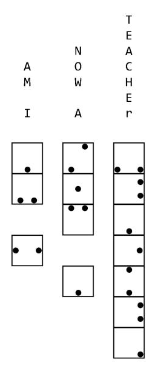um jede Stunde zu weihn.
Ich bin auf der Welt zu gering und doch nicht klein genug
um vor dir zu sein wie ein Ding,
Ich will meinen Willen und will meinen Willen begleiten
die Wege zur Tat;
und will in stillen, irgendwie zögernden Zeiten,
wenn etwas naht,
unter den Wissenden sein
oder allein.
und will niemals blind sein oder zu alt
um dein schweres schwankendes Bild zu halten.
Ich will mich entfalten.
Nirgends will ich gebogen bleiben,
denn dort bin ich gelogen, wo ich gebogen bin.
Und ich will meinen Sinn
wahr vor dir. Ich will mich beschreiben
wie ein Bild das ich sah,
lange und nah,
wie ein Wort, das ich begriff,
wie meinen täglichen Krug,
wie ein Schiff,
das mich trug
durch den tödlichsten Sturm.
“… as if no one had ever tried before, try to say what you see and feel and love and lose. Don’t write love poems; … rescue yourself from these general themes and write about what your everyday life offers you; describe your sorrows and desires, the thoughts that pass through your mind and your belief in some kind of beauty – describe all these with heartfelt, silent, humble sincerity and, when you express yourself, use the Things around you, the images from your dreams, and the objects that you remember. If your everyday life seems poor, don’t blame it; blame yourself; admit to yourself that you are not enough of a poet to call forth its riches; because for the creator there is not poverty and no poor, indifferent place. … – And if out of this turning-within, out of this immersion in your own world, poems come, then you will not think of asking anyone whether they are good or not.”











